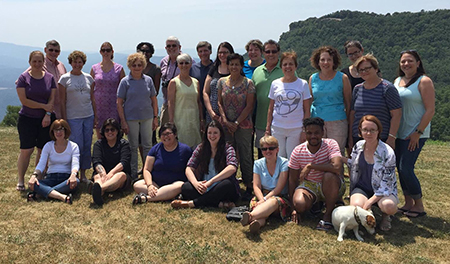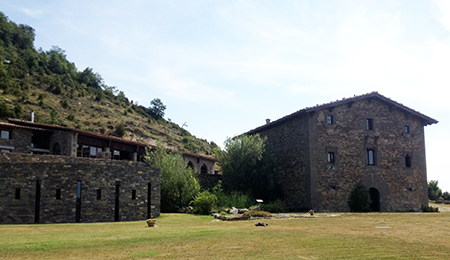
|
an ongoing series by Thomas E. Kennedy and Walter Cummins
|
L'AVENC DE TAVERTET:
MURPHY WRITING GETAWAY
Essay and Photographs by Heather Lang
Tavertet is located in Catalonia, an autonomous community of Spain, which stands just south of France and along the Balearic Sea. I wonder what Gemma Gorga, the first Catalan poet I’ve ever had the pleasure of reading, might say about my concern. Within our reading packets, which were carefully crafted by workshop leader Peter Murphy, we found four of Gemma’s poems from a 2013 anthology titled Six Catalan Poets (Arc Publications, 2013). Each of the Gorga poems was written in Catalan and translated into English by Anna Crowe.
Among the pleats of my mother’s skirt.
 Landscape
Landscape
Here are a few lines from “Going Back,” which Gemma read to us during an afternoon visit. Within this poem, she writes of her particularly petite stature as a young girl and contemplates the ways in which this might still define her today. She writes of her smallness and, consequently, becoming “lost”:
This theme of identity carried throughout our week in residency. Peter Murphy, founder of Murphy Writing of Stockton University, had invited Gemma to spend some time with us, writers of all genres from nonfiction to poetry. We came from locations such as New Jersey, Los Angeles, Qatar, and Spain, but everyone shared one thing in common, contributions to a truly supportive (via warm encouragement) and constructive (via attentive feedback) community. For Peter’s invitation, both to us and to Gemma Gorga, I was immensely grateful. Regarding Gemma, the sparse, imagistic, and lapidary qualities of her work reminded me of the poetry of the late Argentine poet Alejandra Pizarnik, another writer whose poems I adore.
Once they found me under the buckle
Of the sandals she wore on the beach,
Living between sand and skin.
 Murphy Writing Group
Murphy Writing Group
Photo by Amanda Murphy, director of the program
Peter Murphy is a kind and brilliant teacher known for inspiring his workshopping writers – oftentimes through generative prompts – to contemplate deeper connections, the ones that tend to render writers’ work more evocative and complex, and, within this vein, the location, Catalonia, inspired Peter to focus our discussions, loosely, around themes such as identity, independence, and transformation. This was, in part, due to Catalonia’s citizens longing to maintain their unique language and customs …while, for example, holding a Spanish passport. While I won’t pretend to understand the political or cultural details of the situation, we learned of elements of Catalan life, such as this: our exquisite yet humble visiting poet, Gemma, teaches in Spanish at Barcelona University, but her poetry … she always writes her poetry, which is precise and sophisticated, in Catalan. This type of dual identity, if I may, does not seem to be unusual.
At first, when it crossed my mind that the view from l’Avenc was a place too pretty for poetry, I was overcome with guilt. I thought to myself in that cliché phrase: Talk about first-world problems. But, I also understood that each of us finds our own writerly inspiration in different places, and lately my poetry has been fueled by the pushes and pulls of urban living. I live in Seattle, and, for example, my most recently accepted poem, “Overheard Hunger,” forthcoming in Pleiades, was born in the bustling Portage Bay Café, a Seattle city-esque brunch spot that I gravitate toward, and each section of the piece is launched by an overheard bit of often-hurried conversation. (L’Avenc, on the other hand, is built above the village of Tavertet upon 200-meter-high cliffs, or cingles in Catalan, and seems to exist above the noise of the world.) Moreover, “Overheard Hunger” explores familial and other relationship tensions (which we were, rightly, urged to leave at home as we embarked on our Getaway to Write – Spain journey).
 L'Avenc
L'AvencThose mornings at l’Avenc de Tavertet, I woke in a rustic cottage, which had once been a stable. The owners of the tranquil l’Avenc had lovingly converted them. L’Avenc is known as a castle in Catalonia, Spain – you might consider reading A Castle in Spain by Matthew Parris – and we did eat like royalty. In addition to artisan breads and baked goods, local and organic olives, yogurt and honey, melons, and more greeted us throughout the day, and we were introduced to exquisite regional specialties ranging from savory coca (pastry), mar i muntanya (seafood and meat combinations),
| pa amb tomàquet (bread with tomato), and more. Alongside a sweet l’Avenc resident canine, who made me feel more at home, writers sat in an outdoor workshop after dining – our leader’s backdrop: the mountains – and we discussed a variety of thought-provoking literature … and much more. I learned, for example, that a handful of our warm-hearted writers in residency seemed to be at l’Avenc not only to escape their daily lives to make room for their writing but also, perhaps, to escape loss. |
 Resident canine
Resident canine
|
Heather Lang’s poetry has been published by or is forthcoming within Pleiades, december, Mead, Jelly Bucket, The Normal School online, and others. She serves as the Online Managing Editor for The Literary Review, as Co-Editor for Petite Hound Press, and as an adjunct professor. Recently, Heather earned her MFA in Creative Writing from Fairleigh Dickinson University. Her chapbook manuscript was named a semifinalist in the 2014 Tupelo Press Snowbound Chapbook competition, her poetry has been twice nominated for Pushcart Prizes, and she will serve as an AWP16 moderator/panelist.
Heather would like to thank Murphy Writing of Stockton University for awarding her the Spain 2015 scholarship and also the Jan-Ai Scholarship committee for their generous gift, as these allowed her to attend the Getaway To Write in Tavertet.
[copyright 2015, Heather Lang]
 Cottages
Cottages Down the road
Down the road